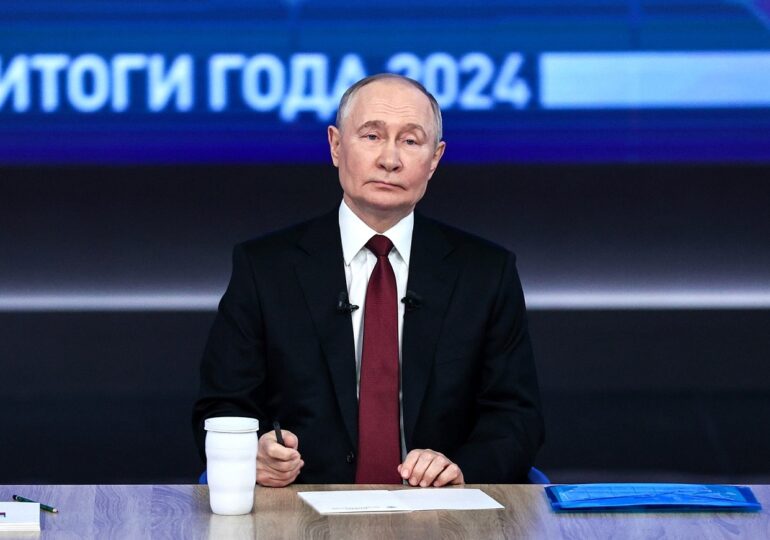Despite the nightly rocket and drone attacks on Ukrainian cities and the over one million victims, Moscow has not officially declared war on Ukraine yet. Experts say it would be a mistake for Vladimir Putin to do so.
After almost three and a half years since the invasion of Ukraine, the Kremlin finds itself in a dilemma of its own making, continuing what is clearly a war but avoiding naming it as such for fear of a negative domestic reaction, writes The Kyiv Independent.
An official declaration of war would have far-reaching implications for the country's industry and economy, while also allowing the Kremlin to launch a full mobilization.
The partial mobilization announced in September 2022 led to the only large-scale protests against the war within Russia, making it clear to Putin that any further measures would cause serious political problems.
"Putin has shielded himself in this war by separating the direct effects of the war from the majority of the Russian population. But as soon as this begins to manifest and be felt by a larger part of the Russian people, he will have more problems," said Karolina Hird, deputy head of the Russia department at the Institute for the Study of War, as quoted by the publication.
According to reports cited by the Ukrainian publication, recent turmoil has emerged in the Kremlin after Ukraine's audacious Spider Web Operation, with hardliners pressuring Putin to issue an official declaration of war that would allow for reprisals and escalations, granting the Russian government full authority to fully prepare the country for war.
However, consulted experts say this is unlikely and note that in every respect, Russia's industry and economy are already on a war footing, even though Kremlin officials deny it. Putin simply cannot risk his power by initiating a mobilization that would be deeply unpopular, they point out.
What Would a Declaration of War by Russia Mean
The two major factors at play in this scenario are the Russian economy and the Russian people.
A full entry into war would involve a complete redirection of the economy and workforce towards the defense sector and arms production, allowing for a full mobilization to recruit the necessary personnel.
Moscow is expected to allocate 6.3% of its GDP to defense this year - the highest level since the Cold War, but still far below what a fully mobilized country for war would indicate.
By contrast, Ukraine spent 34% of its GDP on defense last year. For comparison, British military spending exceeded 50% of GDP during World War II.
Russian Ambassador to the UK, Andrey Kelin, mentioned these figures in an interview with CNN last week, as evidence that Russia is still conducting a "special military operation" and not a war.
However, experts disagree.
"The Russian economy is already on a war footing, and the 6.5% of GDP spent on defense for 2025 is likely an underestimate. Defense production in key capability segments such as drones, missiles, and armored vehicles is at full throttle, with up to three shifts per day," said Federico Borsari, defense expert at the Center for European Policy Analysis in Washington.
Russia has significantly increased its arms production in recent months as it depletes its stockpiles. According to data provided by Ukraine's military intelligence services (HUR), released to the Kyiv Independent earlier this month, production of ballistic missiles, for example, has increased by at least 66% in the past year.
Hird agrees with Borsari's analysis - the massive increase in defense arms production is a sign that, despite Russia's claims of not being at war, its depleted stocks are a clear indication that it is at war.
The Issue of Human Resources
The only crucial area in which a total declaration of war against Ukraine could significantly increase Russia's fighting capacity is in terms of human resources.
Throughout the large-scale invasion of Ukraine, Putin has avoided a total mobilization, aware of the negative internal reaction it would create. Instead, the Kremlin has simply paid people to fight, offering huge enlistment bonuses to encourage volunteers, a method that has so far managed to offset the army's massive losses but which many experts consider unsustainable.
In a scenario where the conflict shows no signs of ending, Putin would likely face a huge dilemma - how to find enough people to fight without risking his own power?
"They are aware of the massive risks involved, and Putin is quite reluctant to take risks. A total mobilization is expected to have a destabilizing effect on Putin's regime, on the already affected Russian economy, and will certainly unsettle the current public consensus on the war," says Ryhor Nizhnikau, a Russia expert at the Finnish Institute of International Affairs.
The Geopolitical Aspect Matters Too
A declaration of war against Ukraine would also have international consequences for Putin, Nizhnikau emphasizes. "He will no longer be able to pretend (in front of US President Donald Trump and US Special Envoy Steve Witkoff) that he is primarily interested in a partial victory by conquering only the Donetsk region and Crimea."
Moreover, Putin said last week in St. Petersburg, but also conveyed the same message at the NATO summit in The Hague, that Russia poses no threat to NATO and that NATO is arming itself in vain. "But an official declaration of war by Russia would send the completely opposite message," the expert points out.
T.D.

